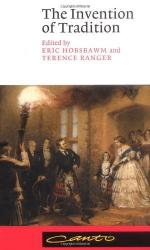
|
Chapter 1, Introduction, Inventing Traditions
1. In chapter one, the author introduces his concept of ________ which are tied to false histories and have contemporary origins.
(a) Valid traditions.
(b) Invented traditions.
(c) False traditions.
(d) Constructed traditions.
2. Hobsbawm asserts that the overtly or tacitly accepted rules of traditions must have a ______ nature.
(a) Symbolic.
(b) Transitional.
(c) Antibolic.
(d) Archetypal.
3. According to the author, values and norms are established through ______ in ritual and tie back to the past.
(a) Repetition.
(b) Singular use.
(c) Chanting.
(d) Sacrifice.
4. The author suggests that the ______ established in created rituals is false and only seems real in the mind.
(a) History.
(b) Continuity.
(c) Ecstasy.
(d) Division.
5. Hobsbawm makes a point to distinguish traditions from ______, which allow more fluctuation.
(a) Customs.
(b) Rites.
(c) Ideas.
(d) Rituals.
6. The author also makes a distinction between traditions and ______, which have no ritual or symbolic significance.
(a) Rites.
(b) Rituals.
(c) Rifts.
(d) Routines.
7. The author suggests that one of the aspects of _______ is the fact that they have an ideological function.
(a) Tradition.
(b) Ritual.
(c) Routine.
(d) Custom.
(read all 180 Multiple Choice Questions and Answers)
|
This section contains 3,952 words (approx. 14 pages at 300 words per page) |

|




